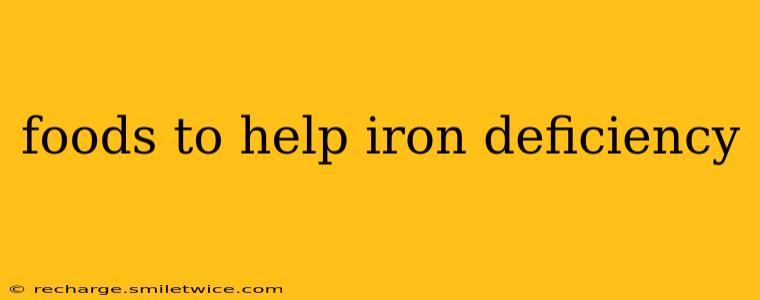Iron deficiency is a common nutritional deficiency, affecting millions worldwide. It occurs when your body doesn't have enough iron to produce hemoglobin, a protein in red blood cells that carries oxygen throughout your body. This can lead to fatigue, weakness, headaches, and other symptoms. While medication can be necessary in some cases, dietary changes can significantly improve iron levels. This comprehensive guide explores the best foods to help combat iron deficiency and boost your iron intake naturally.
What are the best foods to eat if you have low iron?
The key to improving iron levels through diet lies in consuming both heme and non-heme iron sources. Heme iron, found in animal products, is more readily absorbed by the body than non-heme iron, found in plant-based foods. A balanced approach incorporating both types is ideal.
Excellent Sources of Heme Iron:
- Red Meat: Beef, lamb, and other red meats are exceptionally rich in heme iron. A 3-ounce serving of lean beef can provide a significant portion of your daily iron needs.
- Poultry: Chicken and turkey, especially dark meat, are good sources of heme iron.
- Fish and Seafood: Certain types of fish, such as tuna and salmon, as well as shellfish like clams and oysters, are excellent sources of iron. Oysters, in particular, are incredibly high in iron.
Excellent Sources of Non-Heme Iron:
- Legumes: Lentils, chickpeas, kidney beans, and black beans are packed with non-heme iron. Including legumes regularly in your diet can significantly boost your iron intake.
- Spinach and other Dark Leafy Greens: Spinach, kale, collard greens, and other dark leafy greens are excellent sources of non-heme iron.
- Dried Fruits: Raisins, apricots, and prunes are surprisingly high in iron. A handful of these can contribute to your daily intake.
- Fortified Foods: Many breakfast cereals, breads, and other processed foods are fortified with iron. Check the nutrition labels carefully.
- Nuts and Seeds: Pumpkin seeds, sunflower seeds, and almonds are good sources of iron, although absorption may be lower than from other sources.
What foods increase iron absorption?
The absorption of non-heme iron can be enhanced by pairing it with foods rich in vitamin C. Vitamin C acts as an enhancer, improving the body's ability to absorb iron from plant-based sources.
Foods high in Vitamin C that enhance iron absorption:
- Citrus Fruits: Oranges, grapefruits, lemons, and limes are excellent sources of vitamin C.
- Strawberries: These berries are packed with vitamin C.
- Bell Peppers: Especially red bell peppers, contain high levels of vitamin C.
- Broccoli: This cruciferous vegetable is another good source of vitamin C.
What foods decrease iron absorption?
Conversely, some substances can hinder iron absorption. It's advisable to avoid consuming these alongside iron-rich foods:
- Tannins: Found in tea, coffee, and red wine, tannins can interfere with iron absorption.
- Phytates: These compounds, present in whole grains, legumes, and nuts, can also reduce iron absorption. However, soaking, sprouting, or fermenting these foods can reduce phytate levels.
- Calcium: While essential, excessive calcium intake from dairy products can compete with iron absorption.
How much iron do I need daily?
The recommended daily allowance of iron varies depending on age, sex, and overall health. It's crucial to consult a doctor or registered dietitian to determine your individual iron requirements. They can assess your iron levels through blood tests and recommend appropriate dietary adjustments or supplements if necessary.
Can I get enough iron from food alone?
For many individuals with mild iron deficiency, dietary changes alone can be sufficient to improve iron levels. However, in cases of severe iron deficiency or certain medical conditions, iron supplements may be necessary. A healthcare professional can help determine the best course of action.
Are there any other tips for improving iron absorption?
Beyond diet, here are a few additional tips:
- Cook in cast iron cookware: Cooking acidic foods (like tomato sauce) in a cast-iron skillet can add iron to your meal.
- Choose lean sources of protein: Lean meats are preferable as they offer iron without excessive saturated fat.
- Consult a doctor: If you suspect you have an iron deficiency, schedule a checkup with your doctor for proper diagnosis and treatment.
By incorporating these iron-rich foods into your diet and following these tips, you can naturally boost your iron levels and improve your overall health. Remember, a balanced diet and regular consultations with healthcare professionals are key to maintaining optimal health.
